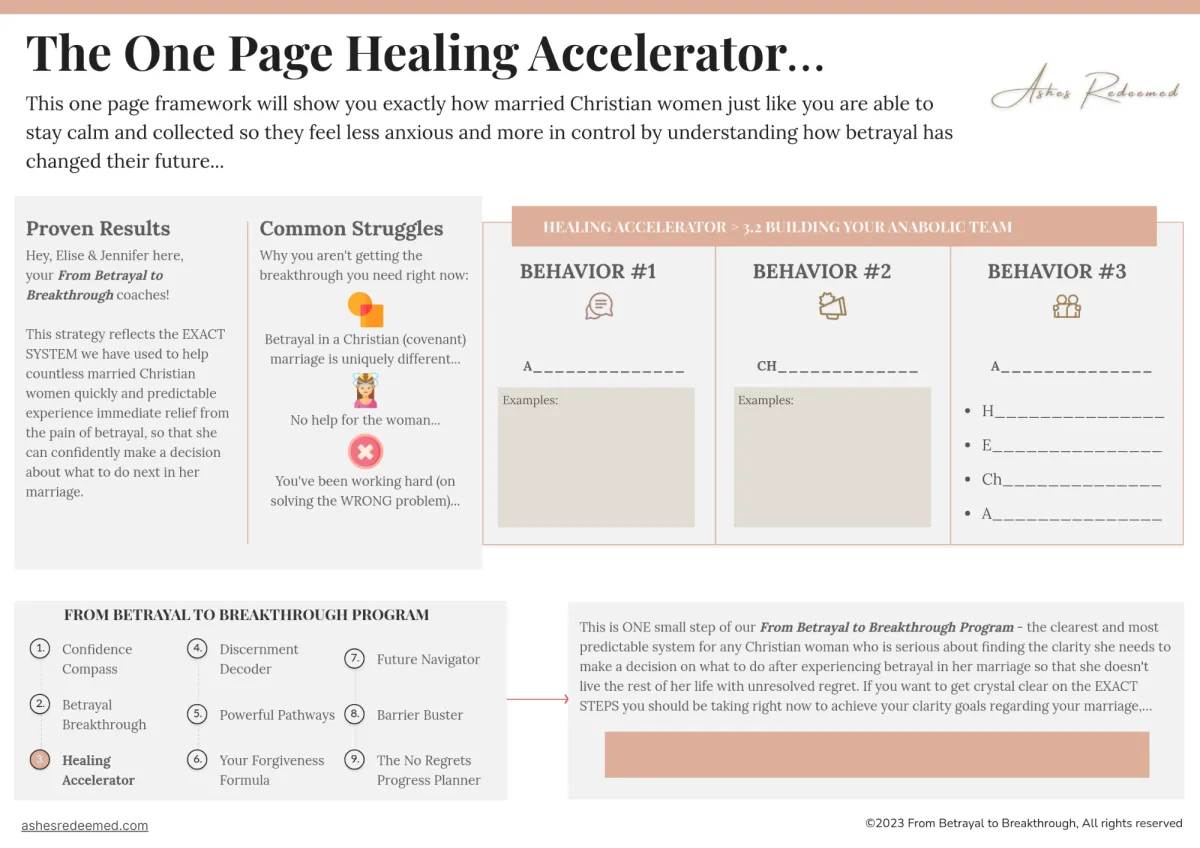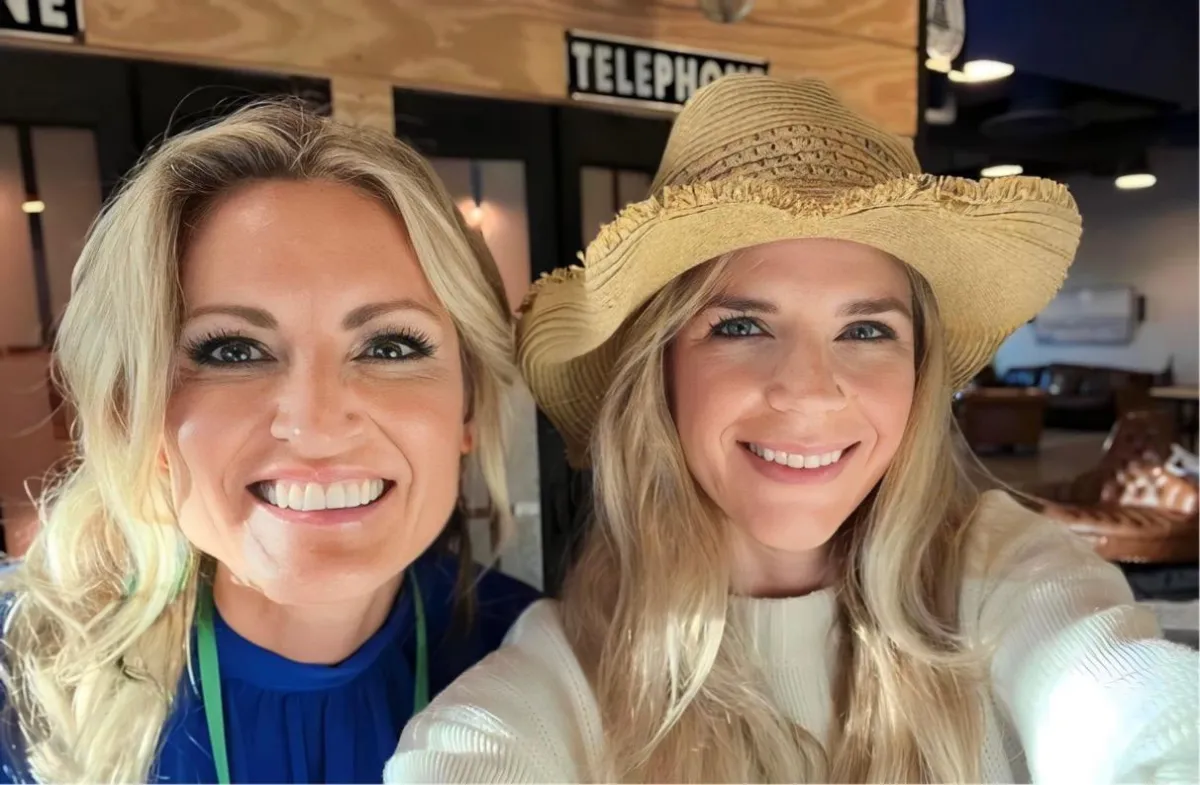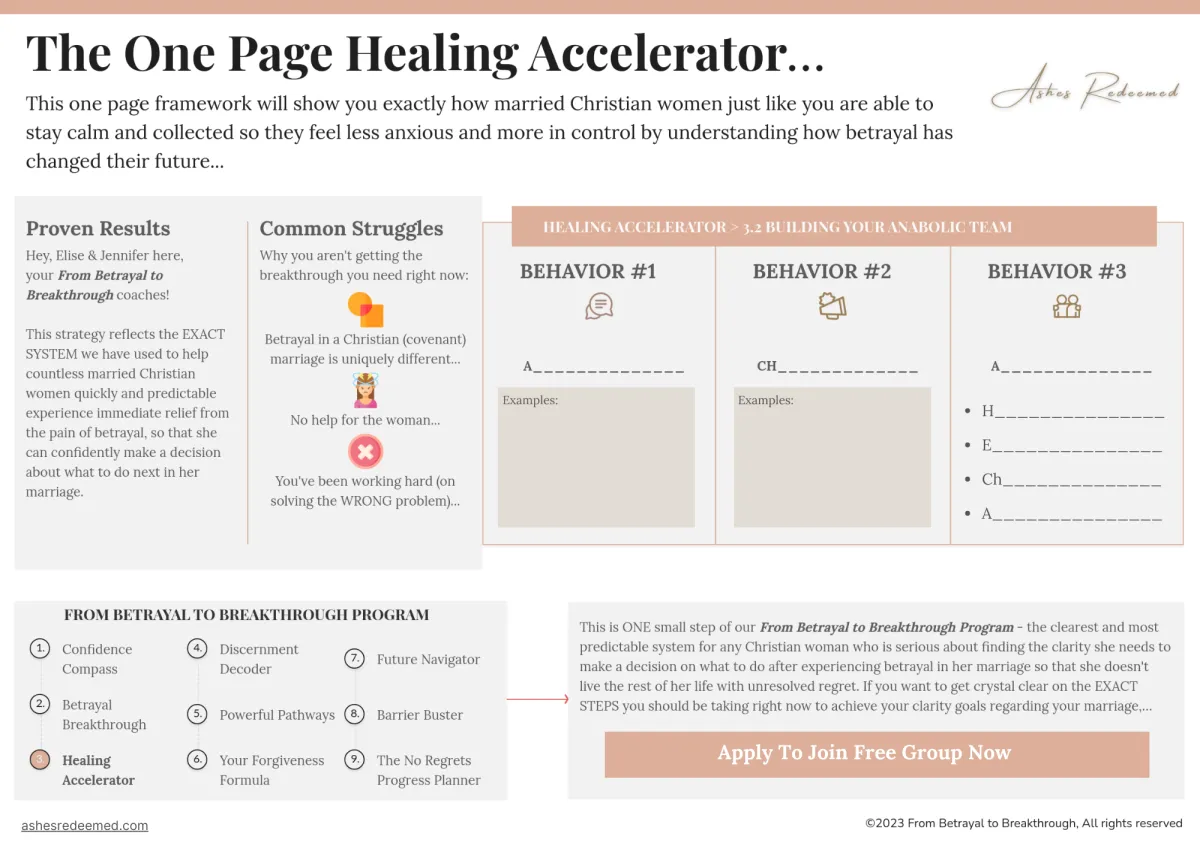
Marriage Coaching for Christian Women
Coming Soon!
Free Resource Library
Scroll down to see:
The Ashes Redeemed Blog
Bi-Monthly Faith & Fellowship Zoom Calls
On-Demand Trainings
Free Resource Library
Scroll down to see:
The Ashes Redeemed Blog
Bi-Monthly Faith & Fellowship Zoom Calls
On-Demand Trainings
The Ashes Redeemed Blog

Good Thought Hygiene (And how practicing it can give you your power back!)
Like many wives, Anita was so focused on John that she totally neglected herself. She spent all of her energy either trying to win his affection or punish him for his behavior. Before she could start to take care of herself, she needed to believe a very important fact: Her husband’s behavior was not her fault.
[…]
Many wives go to great lengths to change themselves in hopes of regaining their husband’s fidelity. They may alter their physical appearance, their spending habits, their domestic skills, or their performance in bed. Anita tried everything she could think of, but nothing worked. She didn’t realize that her thinking was based on the myth that she could change herself enough to restore her husband’s faithfulness to her till death parted them.
You could be an absolutely terrible wife, and your husband could still decide to keep his marital vows. On the other hand, you could be Wonder Woman, and he might still betray you. His choices are his responsibility.
Your responsibility is to be the woman God created you to be. And you need to realize that God didn’t create you to take care of your husband and everyone else but neglect yourself to the destruction of your own well-being. You are the daughter of the Kind, the beloved of your Father, the redeemed of the Lord.
You won’t feel any of those truths if you’re stumbling along regretting or being preoccupied with your passive or aggressive reactions.
-Aftershock, by Joann Condie
Often, it’s our feelings that run the show.
When we’re depressed, we can’t get moving.
When we’re disappointed, we slow down or stop.
When we’re aggravated, we may lash out.
We can acknowledge that these feelings are all a normal part of our human experience, and at the same time recognize that we don’t usually enjoy feeling stuck, let down, or out of control, nor want to spend any more time this way than we have to.
Relationships–particularly intimate ones– are one area where most of us experience significant ups and downs. The women we work with who have experienced intimate betrayal–either by their current spouse or in an earlier relationship–share that these feelings of doubt, distrust, or uncertainty carry a palpable sensation of heaviness. When something has happened “to us”, something out of our control such as the discovery of an affair or hidden pornography use, we feel it in our body, spirit, and attitude.
It’s understandable that everything in life feels like an uphill battle when we’re working against situations, relational dynamics, and circumstances that are blocking our energy. We can feel metaphorically backed into a corner, fists clenched, and ready for a fight. Or, we may be fearful, confused, or unable to see a path forward. And unless we find a way to release this energy, we may one day realize that we’ve lived this way year after year after year.
The good news is that just by noticing and identifying these feelings, you’ve already started on the path to taking your power back–even if you’re not entirely sure what will come next. Keep reading for some practical tools you can use to observe, examine, and discern which thoughts are helping you, and which ones are keeping you stuck in the spin cycle.
What isThought Hygiene?
Every emotion we have first started as a thought. Master coach Brooke Castillo defines a thought as: “A sentence inside of our head.”
Our thoughts generate our feelings.
And while the emotions we feel take center stage and may even feel overwhelming and obvious, the specific sentence inside of our brain that generated that feeling often escapes our awareness.
It might be tempting to assume that we cannot help our feelings. After all, feeling sad, angry, and resentful are all perfectly understandable responses to betrayal. They are not, however, the only responses.
To illustrate this, let’s use a less emotionally changed example.
I once heard about a wealthy woman who earned her fortune as an author. She decided to invest her millions with someone who convinced her that her money would not only be safe, but would grow as a result of his firm’s astounding success managing investments. For years, she felt a sense of accomplishment in her earnings and security in her wealth, only to learn one day that the investor had defrauded her and the money was actually gone.
She went from secure and confident in one moment, to demoralized and panicked in the next.
Now, the money had been gone long before she knew about it. So what changed?
What changed was the sentence in her brain about her money and investments.
Practicing good thought hygiene can be described as being aware of the thoughts that emerge in our mind and the feelings that come as a result of them.
From there, we can examine those thoughts and ask ourselves, “How true is this thought?”
We have the power to accept or reject any thought. Noticing a thought doesn’t mean we have to accept it as truth.
Below, I’m sharing a practical tool to help practice good thought hygiene. Some even call this “self-coaching”. While she didn’t invent these concepts, the model I’m sharing with permission has been formatted by Brooke Castillo. C-T-F-A-R is an acronym to help one untangle the facts of their circumstances from the feelings and results that come from their thoughts.
C: Circumstances (these are occurrences that are out of our control, are neutral–neither good nor bad–they just “are”)
Our circumstances can trigger our thoughts
T: Thoughts (a sentence inside your brain)
Thoughts causes our feelings
F: Feelings (emotion)
Feelings cause our actions
A: Actions (the things you do or don’t do)
The actions we take determine our results
R: Results (what happened)
The results we get prove our thought to be “true”
Let’s do another example using the woman who was defrauded by the bogus investor. If we were to use this model on her thought about her money before she learned of the crime, it might look something like:

Let’s now look at how a different thought about the same circumstance can change the trajectory.

Please don’t let the simplicity of this tool fool you. Using this model on your own thoughts is a powerful way to examine what’s going on behind the closed doors of your consciousness.
Let’s walk through a model using an issue related to intimate betrayal. The following is how Bonnie diagrammed her thought after learning that her husband, who we will call “Ray” had secretly been using pornography for years. We'll call this the "before model" because this was the reactive, unintentional thought she initially identified.

Remember, there is nothing “wrong” with this model. We are simply examining what thoughts and feelings are present given the circumstance. As her coach, I am not insinuating that Bonnie should feel any differently than she does. However, because Bonnie’s current RESULT is not what SHE wants, she tried on a few other thoughts to explore what other feelings/results may be available to her.
In this case, both Bonnie and Ray are professing Christians who agree that pornography use does not have a place inside of their marriage covenant. Ray admitted to feeling relieved that Bonnie finally found out about his hidden behavior, has sought her forgiveness, is receiving individualized help on his own, and wants to restore her trust. Below is one of Bonnie’s alternative, on-purpose models.

As we’ve already discussed, a husband’s decisions are his own to make. We cannot control what he chooses to do. Bonnie had many more models, as every individual thought produces its own feeling.
Just like you might notice a garment in a department store, and decide to try it on, you can do this with thoughts, as well. You may not like how a particular thought makes you feel, and it might take some time to explore whether or not a new thought actually feels believable to you.
Be patient with yourself as you utilize this tool. Think of it as a magnifying glass, not an answer key. Whenever I explain this tool to my clients, there are a few tips I like to be sure to give for clearest results:
Thoughts come in and out of our awareness like clouds in the sky. They come and go.
If you find yourself beginning to dwell on a thought that is contrary to God’s Word, use this as an opportunity to confess it to the Lord and ask Him what He would have you do with that thought.
(II Corinthians 10:5)Thoughts can also be like birds. We may choose to catch one, examine it, and either accept it as true, or release it.
Your “circumstance” line is something that is out of your control, and affecting your energy. You may leave this line blank if you have already identified a thought to examine.
“A prudent man gives thought to his ways.”
Psalm 14:15
Remaining ignorant of one’s thoughts and the effects they have on their life will result in that person living in a constant state of flux–it’s difficult to exercise self-control and thereby regain our footing without being willing to examine what’s going on in ourselves. We pray that this tool is a blessing to you. Should you decide to use it, let us know what your experience was like in testing it out by emailing us at info@ashesredeemed.com–we’d love to hear from you.
Blessings,
Elise Park
The Ashes Redeemed Blog

Good Thought Hygiene (And how practicing it can give you your power back!)
Like many wives, Anita was so focused on John that she totally neglected herself. She spent all of her energy either trying to win his affection or punish him for his behavior. Before she could start to take care of herself, she needed to believe a very important fact: Her husband’s behavior was not her fault.
[…]
Many wives go to great lengths to change themselves in hopes of regaining their husband’s fidelity. They may alter their physical appearance, their spending habits, their domestic skills, or their performance in bed. Anita tried everything she could think of, but nothing worked. She didn’t realize that her thinking was based on the myth that she could change herself enough to restore her husband’s faithfulness to her till death parted them.
You could be an absolutely terrible wife, and your husband could still decide to keep his marital vows. On the other hand, you could be Wonder Woman, and he might still betray you. His choices are his responsibility.
Your responsibility is to be the woman God created you to be. And you need to realize that God didn’t create you to take care of your husband and everyone else but neglect yourself to the destruction of your own well-being. You are the daughter of the Kind, the beloved of your Father, the redeemed of the Lord.
You won’t feel any of those truths if you’re stumbling along regretting or being preoccupied with your passive or aggressive reactions.
-Aftershock, by Joann Condie
Often, it’s our feelings that run the show.
When we’re depressed, we can’t get moving.
When we’re disappointed, we slow down or stop.
When we’re aggravated, we may lash out.
We can acknowledge that these feelings are all a normal part of our human experience, and at the same time recognize that we don’t usually enjoy feeling stuck, let down, or out of control, nor want to spend any more time this way than we have to.
Relationships–particularly intimate ones– are one area where most of us experience significant ups and downs. The women we work with who have experienced intimate betrayal–either by their current spouse or in an earlier relationship–share that these feelings of doubt, distrust, or uncertainty carry a palpable sensation of heaviness. When something has happened “to us”, something out of our control such as the discovery of an affair or hidden pornography use, we feel it in our body, spirit, and attitude.
It’s understandable that everything in life feels like an uphill battle when we’re working against situations, relational dynamics, and circumstances that are blocking our energy. We can feel metaphorically backed into a corner, fists clenched, and ready for a fight. Or, we may be fearful, confused, or unable to see a path forward. And unless we find a way to release this energy, we may one day realize that we’ve lived this way year after year after year.
The good news is that just by noticing and identifying these feelings, you’ve already started on the path to taking your power back–even if you’re not entirely sure what will come next. Keep reading for some practical tools you can use to observe, examine, and discern which thoughts are helping you, and which ones are keeping you stuck in the spin cycle.
What isThought Hygiene?
Every emotion we have first started as a thought. Master coach Brooke Castillo defines a thought as: “A sentence inside of our head.”
Our thoughts generate our feelings.
And while the emotions we feel take center stage and may even feel overwhelming and obvious, the specific sentence inside of our brain that generated that feeling often escapes our awareness.
It might be tempting to assume that we cannot help our feelings. After all, feeling sad, angry, and resentful are all perfectly understandable responses to betrayal. They are not, however, the only responses.
To illustrate this, let’s use a less emotionally changed example.
I once heard about a wealthy woman who earned her fortune as an author. She decided to invest her millions with someone who convinced her that her money would not only be safe, but would grow as a result of his firm’s astounding success managing investments. For years, she felt a sense of accomplishment in her earnings and security in her wealth, only to learn one day that the investor had defrauded her and the money was actually gone.
She went from secure and confident in one moment, to demoralized and panicked in the next.
Now, the money had been gone long before she knew about it. So what changed?
What changed was the sentence in her brain about her money and investments.
Practicing good thought hygiene can be described as being aware of the thoughts that emerge in our mind and the feelings that come as a result of them.
From there, we can examine those thoughts and ask ourselves, “How true is this thought?”
We have the power to accept or reject any thought. Noticing a thought doesn’t mean we have to accept it as truth.
Below, I’m sharing a practical tool to help practice good thought hygiene. Some even call this “self-coaching”. While she didn’t invent these concepts, the model I’m sharing with permission has been formatted by Brooke Castillo. C-T-F-A-R is an acronym to help one untangle the facts of their circumstances from the feelings and results that come from their thoughts.
C: Circumstances (these are occurrences that are out of our control, are neutral–neither good nor bad–they just “are”)
Our circumstances can trigger our thoughts
T: Thoughts (a sentence inside your brain)
Thoughts causes our feelings
F: Feelings (emotion)
Feelings cause our actions
A: Actions (the things you do or don’t do)
The actions we take determine our results
R: Results (what happened)
The results we get prove our thought to be “true”
Let’s do another example using the woman who was defrauded by the bogus investor. If we were to use this model on her thought about her money before she learned of the crime, it might look something like:

Let’s now look at how a different thought about the same circumstance can change the trajectory.

Please don’t let the simplicity of this tool fool you. Using this model on your own thoughts is a powerful way to examine what’s going on behind the closed doors of your consciousness.
Let’s walk through a model using an issue related to intimate betrayal. The following is how Bonnie diagrammed her thought after learning that her husband, who we will call “Ray” had secretly been using pornography for years. We'll call this the "before model" because this was the reactive, unintentional thought she initially identified.

Remember, there is nothing “wrong” with this model. We are simply examining what thoughts and feelings are present given the circumstance. As her coach, I am not insinuating that Bonnie should feel any differently than she does. However, because Bonnie’s current RESULT is not what SHE wants, she tried on a few other thoughts to explore what other feelings/results may be available to her.
In this case, both Bonnie and Ray are professing Christians who agree that pornography use does not have a place inside of their marriage covenant. Ray admitted to feeling relieved that Bonnie finally found out about his hidden behavior, has sought her forgiveness, is receiving individualized help on his own, and wants to restore her trust. Below is one of Bonnie’s alternative, on-purpose models.

As we’ve already discussed, a husband’s decisions are his own to make. We cannot control what he chooses to do. Bonnie had many more models, as every individual thought produces its own feeling.
Just like you might notice a garment in a department store, and decide to try it on, you can do this with thoughts, as well. You may not like how a particular thought makes you feel, and it might take some time to explore whether or not a new thought actually feels believable to you.
Be patient with yourself as you utilize this tool. Think of it as a magnifying glass, not an answer key. Whenever I explain this tool to my clients, there are a few tips I like to be sure to give for clearest results:
Thoughts come in and out of our awareness like clouds in the sky. They come and go.
If you find yourself beginning to dwell on a thought that is contrary to God’s Word, use this as an opportunity to confess it to the Lord and ask Him what He would have you do with that thought.
(II Corinthians 10:5)Thoughts can also be like birds. We may choose to catch one, examine it, and either accept it as true, or release it.
Your “circumstance” line is something that is out of your control, and affecting your energy. You may leave this line blank if you have already identified a thought to examine.
“A prudent man gives thought to his ways.”
Psalm 14:15
Remaining ignorant of one’s thoughts and the effects they have on their life will result in that person living in a constant state of flux–it’s difficult to exercise self-control and thereby regain our footing without being willing to examine what’s going on in ourselves. We pray that this tool is a blessing to you. Should you decide to use it, let us know what your experience was like in testing it out by emailing us at info@ashesredeemed.com–we’d love to hear from you.
Blessings,
Elise Park
Monthly Zoom Calls

On-Demand Trainings
Feel Better Now!
Free Micro-Training to Accelerate Your Healing...
This micro-training is just one small step from our From Betrayal to Breakthrough Program-the clearest and most predictable system for any Christian woman who is serious about finding the clarity she needs to make a decision on what to do after experiencing betrayal in her marriage, so that she doesn't spend the rest of her life with unresolved regret.
Get The Big Picture...
The 9 Steps Every Woman Must Take After Betrayal
Learn what nine steps every woman must take after experiencing betrayal in her marriage so that she is equipped to handle the challenge of making post-betrayal decisions as the most resilient version of herself, to honor her faith and values, without settling.
Other Free Resources
Apply to join at no charge

"I feel like I can actually make a choice. Before I was just a victim of my emotions and now I can recognize that and make better choices."
Carrie T.
"This journey has been helping me let myself be human, but then learning how to be human in a way that honors the Lord."
Andrea P.
"I just thought I was tired and burnt out because I was 60, but really I was tired and burnt out because I was just so angry all the time.."
Margie M.

Introducing
The Healing Accelerator Framework
Feel better right now by using our One Page Healing Accelerator Framework to get immediate relief from the pain, confusion, and fear of regret that comes from discovering betrayal in your marriage, by understanding betrayal's impact the way you see your future.
In this micro training, you'll experience just one small piece of our From Betrayal to Breakthrough program-the clearest & most predictable system for any Christian woman who is serious abut finding the clarity she needs to make a decision on what to do next...
Meet Our Facilitators

Hi there!
Expert in Chiropractise Treatment
We're Elise Park & Jennifer Kwiatkowski. As Christian women who have both overcome issues of betrayal in our own marriages, we know what it's like to face certain challenges that are unique to Believers when it comes to post-betrayal decisions.
As Certified Professional Coaches, we have supported women in their wellbeing endeavors for many years, but our passion for equipping Christian women to live authentically in their faith, while becoming the strongest, most resilient & radiant version of themselves has only grown--especially as we see the devastating effects that our hyper-sexualized culture has on the family unit.
We are blessed to see God work powerfully in the lives and marriages of our clients and are honored to be a part of their healing journeys.
Blessings to you,
Elise & Jennifer





What is From Betrayal to Breakthrough?
The From Betrayal to Breakthrough program is a powerful system for helping Christian women find the clarity they need about their marriage in just 90 days without the obstacles of indecision, self-doubt, or fear of regret--so they can finally feel good about moving forward from the discovery of betrayal in the marriage.
So if you want a crystal clear and predictable roadmap to help you figure out if you want to:
A) confidently stay with your husband and work to restore your marriage, or
B) be at peace with moving on from the relationship,
...then you've found it.
How does it work?
Making a long-term decision about your marriage after betrayal isn't easy. There are three ingredients that every woman in this situation must have in place in order to reach a decision that she feels alined with:
Commitment
Being committed to your own spiritual, emotional, and mental wellbeing is an essential first step in getting the clarity you need to move forward. No one can make this commitment for you--it must come from a deep desire to break free of the pain, confusion, and fear that will otherwise keep you stuck in resentment and anger for the rest of your life.
Just like airline attendants tell the passengers, "In case of emergency, put your own oxygen masks first!" this is essentially what we do in our program--we help you put your own "oxygen mask" on first, so that you can make a decision you feel good about, as the strongest version of yourself.
Support
Countless women have shared their betrayal stories with us and almost all of them have remarked how lonely they've felt while dealing with the pain, despite being active in their church community. It's clear to that the support they've gotten has been either not enough, or the wrong kind. Most often this looks like:
-Help for the man (but not for her)
-"Just" advice: "Just hurry up and forgive him..." or "Just leave already..."
Neither of these truly support the healing and wellbeing for the betrayed wife in her decision on how to handle her next steps.
Remember being told to "Stop, drop, and roll!" in case your clothes ever caught fire?
Other people think they're being supportive by shouting from the sidelines what you should do, but that doesn't work for this kind of situation.
Instead of a drill sergeant, you need support that is sensitive, constructive, and methodical; you need compassionate guides and a roadmap to gently lead you through the phases of what's been and help you create what will be.
Benefiting from this kind of support doesn't have to take a long time, but it must be done with care and intention. (Not screamed at you from the sidelines.)
Discernment
The final ingredient needed to achieve the clarity you're looking for is discernment. We know you have a lot of mental and emotional "noise" right now. In addition to all the external factors (like time, money, friends, and family) you also have internal factors influencing the way you respond to your situation, not to mention the spiritual warfare you're contenting with also.
Being able to distinguish truth from lies is essential for moving forward in your decision, so that you're not living in anger, resentment, or regret for the rest of your life.
How is this different from counseling or therapy?
Counseling, therapy, and coaching are all valid, but different modalities for helping a person make productive changes to their life. Coaching as a form of support has its roots in the world of sports and performance, not mental health. In short, coaching helps you create. Many clients benefit from working with a counselor or therapist while also working with a coach. Coaching is not intended to be crisis management. Ashes Redeemed coaches are Certified Professional Coaches, not licensed counselors or therapists.
For more on how coaching works, read What Is Coaching?
How do I know if this will work for me?
With over a decade of combined experience in supporting women in their wellbeing and marriage difficulties, we have honed our systems down to an exact science.
The best way for both of us to gain 100% confidence that this is the absolute best way for you to approach your post-betrayal decisions is to jump on a short call so we can get clear on the exact steps you should be taking based on your specific background and situation.
Book a call {HERE}.
WHAT OUR CLIENTS SAY
I have a new sense of confidence that I don't think I've really ever had...

Christina M.
Breakthrough client
I value myself enough now in my life for the first time in 42 years that I'm going to say enough is enough.

Carole F.
Breakthrough client
Get In Touch
Email: info@ashesredeemedcom
Address
PO Box 35111
Ferguson, MO 63135
YouTube
tiktok




